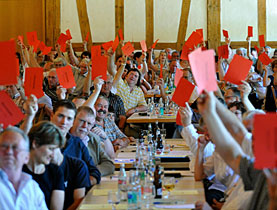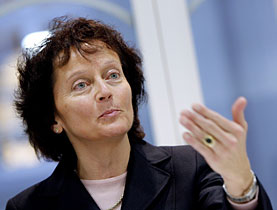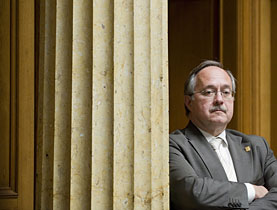New political party takes its first steps

A new party on Saturday entered Switzerland's political arena, formalising the divisions within the rightwing Swiss People's Party over the past two years.
Among those to join the ranks of the Conservative Democratic Party were two cabinet ministers – Eveline Widmer-Schlumpf and Samuel Schmid – and five parliamentarians.
Few people could have foreseen that parliament’s refusal in December to re-elect Justice Minister Christoph Blocher, the strongman of the People’s Party, would have resulted in a new political grouping.
The episode fuelled long-running divisions between the conservative nationalist wing of the party, linked to Blocher, and the moderates associated with Widmer-Schlumpf and Defence Minister Schmid.
The conflict resulted in the exclusion of the party’s Graubünden chapter in June after it refused to eject Widmer-Schlumpf – who the party had earlier accused of colluding with the centre-left Social Democrats to take Blocher’s place in the government.
As a result, Schmid and allies in the People’s Party Bern chapter decided to break away from the national party. Divisions followed in the Graubünden and Glarus chapters.
The rebel branches formed the basis of the new party over the summer. On the agenda of the party assembly in Glarus on Saturday will be the election of party leaders.
Defections
The new party has about 4,000 members spread over the three cantonal branches, says Hans Grunder, the only presidential candidate. The base is expected to expand to include two additional cantonal chapters in Aargau and Thurgau.
In its repatriation to the new party, the Graubünden branch brought two representatives in the cantonal government and 30 of the 32 parliamentarians.
In Bern, the transfer was supported by one of the two members of the cantonal government and 17 of 47 parliamentarians. In Glarus, the People’s Party’s only governmental representative has changed sides along with nearly a third of parliamentarians.
The defections not only touch cantonal politicians. In the municipalities many elected officials have also turned their backs on the People’s Party.
But the support of leading figures does not guarantee that the new party will able to keep its seats because the People’s Party is determined to fight back.
Pressure
Even if the Conservative Democrats have managed to prevail over the People’s Party in three of Switzerland’s 26 cantons, their future seems very uncertain at the national level.
Liberal moderates have always been the dominant force in the People’s Party chapters in Graubünden, Bern and Glarus and have had several run-ins with the national party.
In other cantons, however, it is the nationalists who prevail. It will be difficult for the Conservative Democrats to settle there.
Grunder remains optimistic. He says there are currently divisions within the People’s Party between entrepreneurs, who support a key labour treaty with the European Union and its extension to Romania and Bulgaria, and the nationalists, who oppose it.
This could push some small and medium-sized entrepreneurs to opt for the new party. But if this were the case, there still would not be a rush to join.
But it is an uphill struggle for the new political group as the People’s Party continues to call for the resignation of Defence Minister Schmid, and is hampering his efforts in parliament.
Despite a recent dip in Schmid’s popularity, the minister now seems to have regained credibility and is being unanimously supported again, at least within the Conservative Democrats, says Grunder.
He hopes that Schmid will not succumb to attacks by the People’s Party and throw in the towel.
But regardless the new party is not strong enough to hold on to two – out of seven – seats in cabinet beyond the next elections in 2011.
swissinfo, based on an article in Italian by Sonia Fenazzi
At the federal level, it holds two seats in the government, four in the House of Representatives and one in the Senate.
The Conservative Democrats therefore does not constitute a parliamentary group as a minimum of five representatives are needed in one of the chambers. Hans Grunder says there is a good chance of recruiting a fifth parliamentarian, but he is not giving any names away.
At the cantonal level the Conservative Democrats occupies four governmental seats and 54 parliamentarian places – a modest amount considering Switzerland has 54 cantonal government spots and 2628 parliamentarian seats.
As its name suggests, the Conservative Democrat Party is reclaiming values that are both right leaning and democratic. It wants to defend and promote the interests of the small and medium-sized businesses.
The party is against Swiss entry into the EU but supports “in a clear and unequivocal manner” the bilateral route, including the extension of the free labour movement agreement to Romania and Bulgaria.
The party supports Swiss neutrality but is partisan to an active cooperation by Switzerland to the United Nations, international organisations and Schengen and Dublin agreements.

In compliance with the JTI standards
More: SWI swissinfo.ch certified by the Journalism Trust Initiative




You can find an overview of ongoing debates with our journalists here. Please join us!
If you want to start a conversation about a topic raised in this article or want to report factual errors, email us at english@swissinfo.ch.